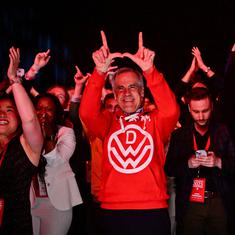What does it take to get a pan masala brand to go viral on social media? Akshay Kumar rapping. The hashtag #BabaElaichi became a Twitter trend in the last week of November, much to everyone’s surprise. Social media couldn’t decide whether it was because the new advertisement was cool or bizarre. What’s evident is that Kumar got everyone’s attention by strutting around various international locations with his little box of Baba Elaichi, surrounded by beautiful women, rapping about his pleasure-filled life and posing the question “What’s your pleasure?”
It’s this kind of attention for a class of products that manufacturers call “mouth fresheners” that the Delhi state government was worried about when it wrote to several Bollywood stars including Shah Rukh Khan, Ajay Devgan, Saif Ali Khan and Sunny Leone asking them not to endorse pan masalas. As of now, only Leone, who has appeared in ads for Shilajit pan masala, has replied to the Delhi government with a promise not to sign on pan masala and tobacco ads in the future.
Pan masala is typically a mixture of ground areca nut with flavourings like cloves, cardamom, betel nut or mint. Although considered a non-tobacco product and less dangerous than tobacco-infused gutkha and khaini, many varieties of pan masalas have been found to contain nicotine and have addictive properties. The Delhi government in its request to the actors has pointed out that a lot of scientific evidence shows that areca nut or supari is carcinogenic.
Apart from having their response or lack of it to the Delhi government scrutinised, the actors could find themselves in a spot of trouble with the Advertising Standards Council of India. The regulator announced that it would investigate whether actors in pan masala ads were violating its rule that disallows ads for products that require health warnings from featuring personalities from the fields of sports, music or cinema.
Big money
There’s a lot more at stake than a rap on the knuckles by the advertising watchdog. For the celebrity endorsers, the pan masala deals come at several crores per year. Priyanka Chopra is supposed have asked for Rs 1 crore more than her regular fee to appear in ads for Rajnigandha Silver Pearls, a product of tobacco giant DS Group that also makes Baba Elaichi. Shah Rukh Khan is reported to have signed a Rs 20 crore endorsement deal for Pan Vilas, the premium pan masala from cigarette maker Godfrey Phillips India.
It was Pan Vilas' entry in the market in 2010 that set off the celebrity-centric ad wars among pan masala makers. When Godrey Phillips launched Pan Vilas against DS Group’s premium product Rajnigandha that has been around since 1983, it made a significant advertising investment to capture some of the share of the market estimated at Rs 25,000 crore. The company claims that Pan Vilas has become a brand worth Rs 200 crore in five years. Having Shah Rukh Khan speak for it, at whatever price, certainly helped.
There was enough at stake for DS Group to invest in a couple of celebrities for its products. Almost 75% of DS Group's revenues come from chewable tobacco and pan masala even after the company has started diversifying into other other non-tobacco related segments. While some analysts feel that pan masala is becoming less socially acceptable, much of India is still hooked to it. After food regulators in 11 states banned both gutkha and pan masala in 2012, contraband sales of these products shot through the roof. According to news reports, a sachet of the premium Rajnigandha pan masala for Rs 8 was being sold for twice that price. Shopkeepers who removed the products from their display said that they were continuing to make robust sales despite the ban.
Getting around the ban
A World Health Organization study found that after the ban of gutkha sales in 26 states and six union territories in 2011, people started buying tobacco and mixing it with pan masala to make their own gutkha. On the other hand, pan masala makers replaced gutkha packets with separate pan masala packets and tobacco pouches with the same brand name, logo and imagery as the gutkha products.
The additional director of health for the Delhi government has, however, requested Khan and other actors to drop their pan masala deals on the grounds that the ads are surrogates for tobacco product ads – a major public health concern for India, which has a big smokeless tobacco problem. The Global Adult Tobacco Survey of 2010 and subsequent studies based on the survey show that India accounts for 74% of the global burden of disease from smokeless tobacco use, mainly the incidence of oral cancer.
Surrogate ads and public health
In a BMJ (formerly the British Medical Journal) blog post, public health advocacy officer Arun Jithendra writes that with the ban on advertising tobacco products completely restricting the marketing of gutkha, the tobacco industry has aggressively pursued the promotion of pan masala as a non-tobacco product in its stead.
“You see these on local government buses, inter-city government buses, autos, billboards, and many other public places. These products (which claim to NOT contain nicotine and tobacco) carry the same brand name, logo/imagery, and wordings/audio as that of tobacco products by the same company. “Unche log, unchi pasand,” used for Manikchand gutkha, is still being used for its non-tobacco counterparts, for example. This is a clear case of surrogate advertising, leading to recollection of tobacco products,” Jithendra writes.
Whether the Bollywood stars agree to stop their endorsements, pan masala promotions aren’t going away anytime soon, as anyone attending the Jaipur Literature Festival this year can tell you.
#WhatATimeToBeAlive Margaret Atwood AND Rajnigandha Paan Masala in one frame. (pic via @TedhiLakeer) pic.twitter.com/kOPPYESvmp
— Aisi Taisi Democracy (@AisiTaisiDemo) January 22, 2016










